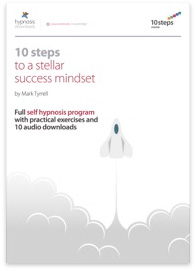7 Self-Discipline Techniques
Tried and tested tips to get you more self-disciplined today
 Pushing through discomfort to achieve a worthwhile goal is the core of self discipline.
Pushing through discomfort to achieve a worthwhile goal is the core of self discipline.We called Alan 'lucky'. At school we thought of him as an incredibly 'gifted' guitarist and he's since gone on to travel the world making a very good living at what he loves to do.
I became good friends with him and soon learned the truth. I stayed over at Alan's house one night and was awoken at 6am (on a Saturday morning) by the melodious sound of his singing guitar. "What are you doing?" I yawned. "It's 6am."
"I always start the day with two hours of practice and do three hours in the evening. If I didn't I'd be hopeless!"
Prefer to watch instead?
Then it hit me. Alan was gifted, but this was a gift that had started out small, perhaps even insignificant, to which he'd added, built upon, and massively extended. Alan had made his own gift.
That taught me something profound. Sure, there is such a thing as natural talent but:
- Natural talent counts for little unless it's supercharged by self-discipline.
- Self-discipline can, to some extent, overcome lack of natural talent.
Exercising self-discipline can make the difference between an averagely talented person doing something amazing with their lives and a naturally talented person realizing very little of their potential.
Over the years I've come to see self-discipline as an invisible magic. You can't see, taste, or smell it, but its effects are huge. It can transform fat into slim, sag into buff, uninformed into expert, poor into rich, misery into happiness. It's the submerged part of the iceberg others don't see when they see your 'genius'.
Yes, luck plays its role and who doesn't need the 'lucky break'? But self-discipline prepares you to ride that break all the way to the shore. Self-discipline makes you happier; it gives you that sense of real achievement earned through sheer intensity of sustained focus.
If you really want to succeed at a task then self-discipline is essential. We were wrong about Alan to assume that his guitar magic had somehow been dished out to him like a Porsche given to an indulged adolescent on reaching eighteen. We had fallen for the biggest myth in the book.
The myth of easy success
Celebrities have never been more visible in our culture. Famous sportspeople, wonderful actors, and musicians are all over the media. But what we don't see are the thousands of hours of super-focused work these people have put in behind the scenes.
It's easy to feel that success comes easily; that it's just a question of self-belief. But anyone who has achieved anything has done so because they've been able to control and direct their own inner lives and actions to the extent that has enabled them to become super-able at what they do.
Life is not a waiting room
Life isn't some waiting room in which to 'kill time' with repetitive self-amusements.
Self-discipline, like a muscle, can be developed. If we were raised in a disciplined environment, we may find it easier to be self-disciplined, but we can all develop more.
The following self-discipline tips have been gleaned from how top achievers manage and develop ability. Try them:
1) Don't wait to 'feel like it'
In some ways, exercising self-discipline is harder than ever before. We're all encouraged to feel something should entertain us before it is worthwhile. We become brainwashed with messages like:
"Don't do it unless you feel like it!"
"If it feels good, do it!"
"Yeah, the money's good but I'm not getting up at that time!"
Choosing to do something or not based on whether it feels comfortable/pleasurable or not is a disaster. If I waited to 'feel like it' before exercising or working or making that tricky phone call or putting in the occasional all-nighter to meet a deadline, then I would be much less disciplined than I am now and believe me that would be really bad. : o
"Don't have a wishbone where your backbone should be!"
2) Finish what you start (as a point of honour)
Winston Churchill could only offer the British people 'blood, sweat, and tears', but victory was the greater goal for the whole nation. Really think about:
A, How much you want to achieve a greater goal (be it weight loss, a finished novel, new business, or mastering a musical instrument).
B, How serious you really are.
You may think you are serious and even tell others how serious you are, but only your actions really convey how genuine you are. Better you keep silent and get on with it than delude yourself and others.
Focus on the long-term 'big outcome' and self-discipline will naturally follow. Every morning, get up (yes do please get up!) and tell yourself: "Today is not over until I have done..." – whatever you need to do that day. Literally, you can't finish your day until what you set out to do has been done. I'm not kidding. Respect yourself enough to keep your own promises to yourself.
3) Dump the excuses
Be honest with yourself. Do the following sound familiar?
"I don't want to overdo it!"
"I'll start it when the weather gets better!"
"Well it's too late now to do it, anyway!" (Remember: your day ain't over 'til it's done.)
"I'm not getting support from others so I won't bother then!"
"I'm not going to do it at all now if you're going to take that attitude!"
Now, lest you think I'm holier than thou – perish the thought. I have used all the above excuses and many more besides to mask my own laziness or fear.
But if you are going to make excuses, don't fall for them yourself. Don't believe your own PR.
In fact, start being honest. Tell yourself:
"I'm not going to go for the run now because I'm too soft and lazy."
Or: "I've decided not to give that speech now because I'm too cowardly!"
I've tried this and you know what? Honesty can be hard to take. Harder, in fact, than actually doing the thing you're trying to avoid. Stop mistaking excuses for credible reasons.
4) Sorry, it's non-negotiable
When we start to question whether we are really going to get down to some work, whether it's too late to make a start, whether we should watch the James Bond movie on TV instead, we start to 'leak' motivation. Make self-discipline 'non-negotiable'. I'm guessing you don't um and ah about whether to clean your teeth or pull the chain in the toilet (I'm hoping) – these things are unquestioned by you. Likewise, tell yourself: "I'm not going to listen to excuses or wimp-outs – this is non-negotiable!"
Remember the words of Abraham J. Heschel: "Self-respect is the fruit of discipline; the sense of dignity grows with the ability to say no to oneself."
5) The pull of the external deadline
Alan made promises to himself and he had enough self-respect to keep these promises. No one else put pressure on him to practice so much. But if he had a concert coming up, he worked even harder. External deadlines – working to deliver what others expect from you – can massively boost your drive to succeed. If there are no external deadlines, then make some.
Maybe you do contract work or a publisher is expecting your work by a certain time, so you already have an external deadline. But if you don't, then create an internal one (such as "by July the 1st I'm going to be 12 pounds slimmer") and make it external by telling as many people as possible.
If you need to write 100,000 words in two months, tell other people that on a certain date you are going to get back to them to tell them you've done it. Print off a letter of intent, sign it in front of a friend or several people, and ask them to remind you of your deadline when it arrives and sign again that you have completed it. External deadlines work.
6) Ignore the naysayers
Other people can exert an immensely negative effect... if we let them. Don't let them. Don't let words or even negative facial expressions deter you. Seek the advice of experts by all means and learn from the best, but never accept negativity from people who haven't themselves achieved what it is you are set upon achieving.
If people say what you plan is not possible or sneer at your efforts, don't be deterred by this; rather, use it to fire your energy and strength. Proving others wrong is a greatly underrated pleasure.
7) Don't get hijacked by trivia
We all have a need to complete things, be it a story we are reading or an opera we are composing. If someone starts to tell you a joke (or a piece of gossip), they set an expectation in your brain that you really want fulfilled. But if you have important things to do, things to learn, an important project, then trivial things can 'hijack' this need for completion. Playing endless computer games or watching TV thrillers can leave you feeling satisfied because something has been completed. This is like meeting your physical hunger by eating junk, then no longer wanting to eat real nutrition.
By cutting out (or down) your consumption of TV, gaming, or even newspaper reading, you leave your need for completion free to work on what you really need to be focusing on. You need to feel that things remain unfinished to keep focused and you need to devote valuable time and energy where it's really needed.
Self-discipline is the fuel that gets you places. The happy by-products of discipline are success, self-respect, and improved physical and mental health.
As Alan said: "I have to be true to myself, else I feel like a fraud."
10 Steps to a Stellar Success Mindset course
Let hypnosis drive success habits deep into your unconscious mind...







